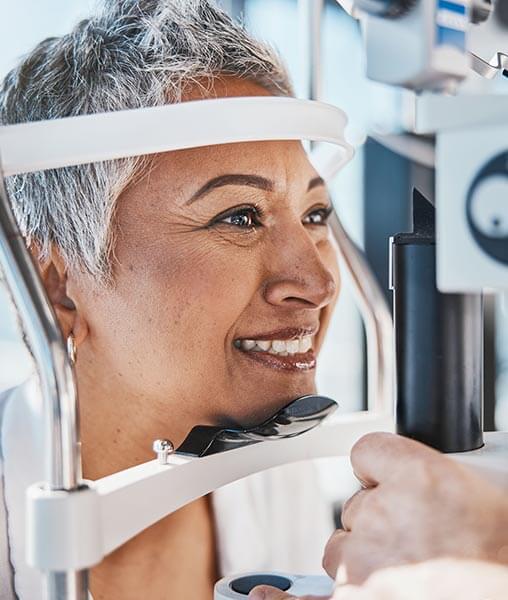Posted by: Albany Cornea | Center For Eye Care Excellence in Comprehensive Eye Care

A corneal thickness test can give crucial information about your eye and vision health. Knowing how the quick, painless, and non-invasive exam works and what to expect can ease your concerns and help you feel confident about taking the next step toward optimal eye health.
Keep reading to learn more about what happens during a corneal thickness test!
What is a Corneal Thickness Test?
The cornea is the transparent tissue at the front of the eye that bends and focuses light on the retina for clear vision. Like the name suggests, a corneal thickness test or pachymetry test measures the thickness of the cornea, helping to diagnose and manage various eye conditions or evaluate your eligibility for refractive surgery.
It also protects your eye by keeping dirt, germs, and other foreign particles out.
When is a Corneal Thickness Test Done?
The thickness of your cornea can affect your overall eye health. Your ophthalmologist may measure corneal thickness due to the following reasons:
Assess Your LASIK Eligibility

Before your LASIK procedure, your surgeon will perform a series of tests, including a corneal thickness test, to determine if you’re a suitable candidate. Your corneas must be thick enough to proceed with the procedure.
During LASIK, your surgeon will create a flap in your cornea. They’ll also reshape your cornea, which involves removing corneal tissue to correct your refractive error and improve vision.
To do this safely and ensure the success of LASIK, your corneas should have sufficient thickness. A corneal thickness test can determine if you have thick enough corneas.
If your corneas are too thin, you’ll likely not qualify for LASIK. Thinner corneas can increase the risk of post-surgical complications such as corneal ectasia, which can distort your vision and even require corneal transplantation in severe cases.
If you’re not a suitable candidate for LASIK due to thin corneas, your surgeon may recommend alternative options.
Evaluate Glaucoma Risk
The thickness of your cornea can also affect eye pressure or intraocular pressure (IOP) readings. If your cornea is thinner, pressure readings might be lower than your actual IOP.
And if your cornea is thicker, eye pressure readings could be higher than the actual IOP. Moreover, having very thin corneas increases your chances of developing glaucoma, independent of your IOP.
It’s crucial for your ophthalmologist to have a correct pressure reading to assess your risk. Once they measure your cornea, they can have a more accurate IOP reading.
Left undiagnosed and untreated, glaucoma can cause permanent vision loss and blindness. Your ophthalmologist can use a corneal thickness test to determine your IOP and risk of glaucoma.
They can then create an appropriate treatment plan to protect your vision from the sight-stealing disease.
Detect Corneal Edema

Corneal edema is a condition in which the cornea swells as a result of fluid buildup. The accumulation of fluid can cause discomfort and affect your vision.
Pachymetry measures the thickness of your cornea to detect fluid buildup and determine the severity of corneal swelling, which can guide treatment decisions.
Monitor Keratoconus
Keratoconus is a progressive condition that causes your cornea to thin, weaken, and protrude into a cone shape, distorting vision. It requires frequent monitoring, and a corneal thickness test can help track any structural changes over time by pinpointing areas of thinning.
This will enable your ophthalmologist to determine if your keratoconus is progressing and needs a change in treatment to stabilize your cornea and slow or halt further progression.
Diagnose and Manage Corneal Diseases
Measuring the thickness of your cornea can help detect, treat, and manage various corneal abnormalities, including corneal scarring and corneal dystrophies.
What Happens During a Corneal Thickness Test?
There are two kinds of pachymetry tests used: ultrasound and optical pachymetry. Both are effective for measuring corneal thickness.
Here’s an overview of what you can expect.
For an Ultrasound Pachymetry:
You’ll sit in an exam chair. Your ophthalmologist will then apply numbing drops to ensure your comfort.
Next, they’ll briefly and gently place a handheld probe or pachymeter on the surface of your cornea. The probe emits ultrasound waves that travel through your corneal tissue.
The amount of time taken for sound waves to bounce back to the probe is recorded. This data is processed to provide an accurate measurement of corneal thickness.
For an Optical Pachymetry:

This method utilizes advanced light wave technology to capture cross-sectional images of your cornea. It provides detailed measurements of corneal thickness without requiring contact with your eye.
You’ll sit in front of a machine, resting your forehead and chin on supports. While looking into the device, your ophthalmologist will direct a laser at your eye to scan your cornea, forming high-resolution images.
The images offer comprehensive data on corneal thickness.
A corneal thickness test takes only a few minutes to complete. There’s no downtime, so you can resume regular activities immediately after.
What Do Your Test Results Mean?
You’ll receive your test results right away, and your ophthalmologist will discuss them with you. Values obtained from your corneal thickness test are essential for diagnosing and monitoring various eye conditions.
Corneal thickness is measured in microns. The average corneal thickness is between 540 and 550 microns.
However, this could vary depending on individual factors, including your age and overall health. So, your corneal thickness can be outside of this range, and your eyes will still be healthy.
This test is often combined with other diagnostic tests to get a more accurate and comprehensive evaluation of your eye health.
Safeguard Your Eyes with a Corneal Thickness Test
A corneal thickness test is an essential diagnostic tool that gives valuable insights into your eye health. Our expert ophthalmologists may recommend the painless test to assess the health of your cornea and diagnose or manage different eye conditions.
Ready to find out if you need a corneal thickness test? Schedule your appointment at the Center for Eye Care Excellence in Albany, NY, today!

